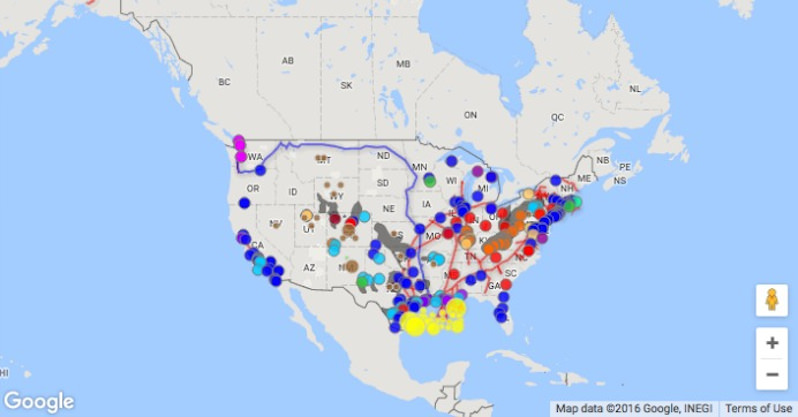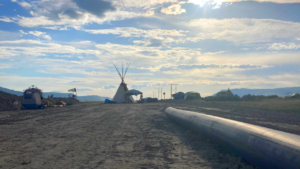Map Shows How Trade Deals Would Enable Polluter Power Grab
The interactive tool "gives people a chance to see if toxic trade is in their own backyard." This new map from the Sierra Club shows hundreds of fossil fuel projects owned by multinationals. Pending trade agreements would let those companies challenge climate protections such as restrictions on fracking. (Screen shot via Sierra Club)
This new map from the Sierra Club shows hundreds of fossil fuel projects owned by multinationals. Pending trade agreements would let those companies challenge climate protections such as restrictions on fracking. (Screen shot via Sierra Club)
By Andrea Germanos / Common Dreams
Is a “polluter power grab” lurking in your backyard?
According to the Sierra Club, one might just be, thanks to two pending trade deals—the Transatlantic Trade and Investment Partnership (TTIP) and Trans-Pacific Partnership (TPP)—that would allow multinational corporations to exert their power before private tribunals and thwart efforts to keep fossil fuels in the ground.
The environmental organization plotted out the coast-to-coast potential threats on a new interactive map, released Thursday.
It captures over 400 fossil fuel projects, and “for the first time … gives people a chance to see if toxic trade is in their own backyard,” said Ilana Solomon, director of the Sierra Club’s Responsible Trade Program.
How do the deals enable such a power grab? By way of a corporate-friendly provision included in many trade deals.
In a report released earlier this year, Sierra Club found that TTIP and TPP “would more than double the number of fossil fuel corporations with the power to challenge U.S. policies” such as restrictions on fracking or offshore drilling using the Investor-State Dispute Settlement (ISDS) mechanisms.
ISDS, as advocacy group Public Citizen has explained, “empowers individual foreign corporations to skirt domestic courts and sue governments before a panel of three corporate lawyers.” Using these tribunals, as analysts have warned, corporations can demand compensation from the U.S. for lost profits as a result of government actions or policies, thereby supplanting local democracy, workers’ rights, and environmental protections. (In fact, Canadian pipeline company TransCanada is using the Investor Chapter of NAFTA to sue the Obama administration for its rejection of the Keystone XL.)
The multinationals could demand compensation for lost profits as a result of environmental protections that blocked their projects. Also, the mere threat of such a suit could thwart “keep it in the ground” efforts, Sierra Club says.
The new map shows, for example, how TTIP would allow Netherlands-based Royal Dutch Shell to challenge restrictions on an oil train terminal in Anacortes, Washington. And that the deal would allow U.K.-based BP—which holds leases over 2.4 million acres in the Gulf of Mexico—to challenge restrictions on offshore drilling. And that TPP would allow Japan-based Osaka Gas Company, which operates a gas power plant in Plattsburgh, New York, to challenge restrictions on gas power plants.
“From gas power plants peppering California and Massachusetts to oil trains rolling through the Pacific Northwest to fracking in Colorado, dirty fossil fuel projects owned by multinational corporations from TPP and TTIP countries are a threat to clean air and water across the country. Toxic trade deals shouldn’t empower these corporations to undermine community efforts to keep fossil fuels in the ground,” Solomon said.
According to Ben Beachy, senior policy advisor for the organization’s Responsible Trade Program, the map “points us to the only path forward: stopping the TPP.”
“Instead of giving more power to fossil fuel corporations, we need to map out a new model of trade that puts people before polluters and paves the way for more climate action,” he added.
Putting further spotlight on the threats posed by ISDS, a group of U.S. senators led by Sherrod Brown (D-Ohio) and including Bernie Sanders (I-Vt.) and Elizabeth Warren (D-Mass.) wrote to President Barack Obama on Thursday outlining problems they see with the TPP in its current form.
ISDS, the senators write, “means our country’s own public health, worker safety, and environmental standards, among others, are vulnerable to corporate challenges.”
Echoing arguments made by the Sierra Club they write, “ISDS challenges, and even mere threats of ISDS challenges, have been used to secure extractive permits over community objections, to get executives out of criminal convictions, and to exonerate managers connected to a factory’s lead poisoning of children. Such a corporate handout does not belong in our trade agreements.”
Sanders said that without fixing this and other “fundamental flaws,” TPP would “accelerate the corporate race to the bottom.”
Your support matters…Independent journalism is under threat and overshadowed by heavily funded mainstream media.
You can help level the playing field. Become a member.
Your tax-deductible contribution keeps us digging beneath the headlines to give you thought-provoking, investigative reporting and analysis that unearths what's really happening- without compromise.
Give today to support our courageous, independent journalists.









You need to be a supporter to comment.
There are currently no responses to this article.
Be the first to respond.